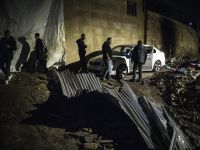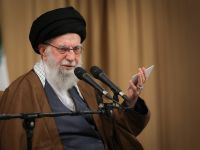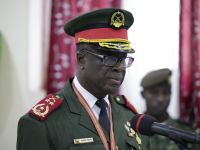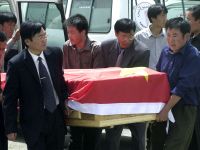Russia and France said on Wednesday a revised U.N. draft resolution on disarming Iraq had moved closer to their own positions.
The United States presented its revised resolution to the U.N. Security Council on Wednesday. It hopes it will be adopted by the end of the week.
The text requires weapons inspectors to report to the Security Council any failure by Iraq to meet its obligations to disarm. According to Reuters, it threatens Iraq with "serious consequences" and says failure to comply would constitute a "further material breach" of accords ending the 1991 Gulf War.
Speaking before the text was presented, Russia's Deputy Foreign Minister Yuri Fedotov, told Itar-Tass news agency the draft contained "several additional steps which take into account Russia's position." But, Fedotov noted Russia remained opposed to any provision automatically granting Washington the right to attack Baghdad if it were deemed in violation of obligations to allow inspections to work unhindered.
"We still believe it is vital that the new resolution contain no automatic mechanism in using force," he said.
French Foreign Minister Dominique de Villepin told parliament progress had been made on France's key demands, namely for a two-step strategy. He said France had "very wide backing among members of the Security Council" in its opposition to anything in the text allowing automatic recourse to military force.
Saudi position
Meanwhile, Saudi Arabia has not decided whether the United States would be allowed to use its airspace and air bases if it goes to war with Iraq, the Saudi foreign minister told The New York Times.
The newspaper said Saudi Foreign Minister Prince Saud al-Faisal sought to revise comments he made over the weekend. In an interview broadcast on CNN Sunday, Prince Saud said: "We will abide by the decision of the United Nations Security Council, and we will cooperate with the Security Council. But as to entering the conflict or using facilities ... that is something else."
According to The New York Times, the remarks caught Bush administration officials by surprise. U.S. officials made urgent consultations with Saudi officials Monday before publicly responding, the daily added.
At a briefing Monday, State Department spokesman Richard Boucher said that after looking at Prince Saud's remarks, and subsequent contacts between the United States and the Saudis, Washington did not conclude that Riyadh ruled out the use of Saudi bases.
In his comments to The New York Times, Prince Saud said there was a misunderstanding when he answered "no" when asked in the CNN interview if Saudi bases could be used in a military operation against Iraq. The Saudi top Prince said that Saudi Arabia would be obliged to "cooperate" with the United Nations if Iraq "refuses the implementation" of the United Nations resolutions "concerning inspections" of its programs for weapons of mass destruction.
"But that does not mean we have to join the fighting, or indeed to leave our bases for use," Prince Saud told the newspaper. "This is a sovereign right of Saudi Arabia to decide when the time comes."
When asked whether Crown Prince Abdullah had decided to support a U.S.-led military campaign, Prince Saud said he could not say more. (Albawaba.com)
© 2002 Al Bawaba (www.albawaba.com)







